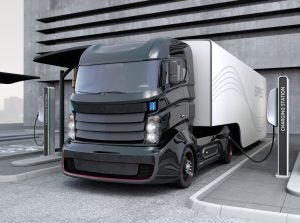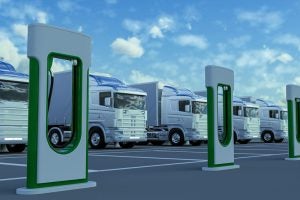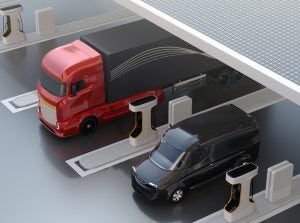 Electric heavy-duty vehicles have come a long way in a pretty short time. Back in 2018, we were excited about prototype vehicles and trucks with 60-mile range. Today there are scores of truck models available at ever increasing ranges, clear market segments where these vehicles can thrive today, and ever-growing fleet interest in deploying these vehicles.
Electric heavy-duty vehicles have come a long way in a pretty short time. Back in 2018, we were excited about prototype vehicles and trucks with 60-mile range. Today there are scores of truck models available at ever increasing ranges, clear market segments where these vehicles can thrive today, and ever-growing fleet interest in deploying these vehicles.
Energy Exchange
4 ways manufacturers can support fleets on their road to electrification
The building blocks are in place for a strong Advanced Clean Fleets rule in California
 By Lauren Navarro & Pamela MacDougall
By Lauren Navarro & Pamela MacDougall
California air regulators are currently considering adoption of the Advanced Clean Fleets rule — a purchase requirement for medium and heavy-duty fleets to adopt an increasing percentage of zero-emission trucks. This rule has the potential to be transformative.
Houston workshop lays foundation for the road to ZEV trucks
 Last month, EDF co-hosted a workshop in Houston on the state of zero-emission heavy-duty vehicles in Texas. Partnering with Evolve, the Houston-Galveston Area Council and Port Houston, we met at the NRG Center with dozens of industry experts, government officials, fleet managers and drivers to talk about the economic and environmental opportunities that transitioning to zero-emission medium- and heavy-duty vehicles offers for Texas. At the end of the workshop, participants were able to enjoy a ride-along with the latest Nikola ZEV truck.
Last month, EDF co-hosted a workshop in Houston on the state of zero-emission heavy-duty vehicles in Texas. Partnering with Evolve, the Houston-Galveston Area Council and Port Houston, we met at the NRG Center with dozens of industry experts, government officials, fleet managers and drivers to talk about the economic and environmental opportunities that transitioning to zero-emission medium- and heavy-duty vehicles offers for Texas. At the end of the workshop, participants were able to enjoy a ride-along with the latest Nikola ZEV truck.
California paves the way to an electric vehicle future with new electrification framework
 By Michael Colvin and Larissa Koehler
By Michael Colvin and Larissa Koehler
Last month California took another significant step forward in advancing the deployment of zero-emission vehicles, with the adoption of a Transportation Electrification Framework by the state’s Public Utilities Commission. The framework establishes a $1 billion, 5-year suite of programs, and it provides a pathway for the state’s large electric utilities to continue to build on what is far and away the most successful deployment of electric vehicles in the country.
U.S. signs global commitment to 100% zero-emission trucks, buses at COP27
 By: Jason Mathers and Peter Zalzal
By: Jason Mathers and Peter Zalzal
The U.S. made an important commitment at COP27 yesterday that will help reduce climate and air pollution from the dirtiest vehicles on our roads and create a foundation for more ambitious action, which is urgently needed to reduce pollution from trucks and buses.
Joining sixteen nations — as well as several states and cities around the world — Secretary Granholm added the U.S. as a signatory to the Global Memorandum of Understanding on Zero-Emission Medium- and Heavy-Duty Vehicles. This commits the U.S. to a goal of 100% zero-emission truck and bus sales by 2040, with an interim goal of 30% new sales by 2030. The global MOU was initiated by CALSTART at COP26 in 2021.
California is proposing a major investment in electric vehicle infrastructure: Here’s what you need to know
 This summer, California made national news by adopting a rule that will require all new passenger vehicle sales to be zero emission by 2035. At the same time, the state is also considering a complementary rule to replace medium- and heavy-duty trucks and buses to also be zero emissions. To support this transition, California will need to make a major investment in electric vehicle charging infrastructure.
This summer, California made national news by adopting a rule that will require all new passenger vehicle sales to be zero emission by 2035. At the same time, the state is also considering a complementary rule to replace medium- and heavy-duty trucks and buses to also be zero emissions. To support this transition, California will need to make a major investment in electric vehicle charging infrastructure.
The California Energy Commission estimates that by 2030 California may need up to 1.2 million EV chargers to support an estimated eight million passenger electric vehicles and an additional 157,000 chargers to support non-passenger vehicles, such as trucks and buses. There are currently over 1.2 million electric passenger vehicles on California’s roads, and significantly fewer chargers than will be needed in 2030. The charging needs of trucks and buses are vastly different from those of private cars — in terms of power demands, locations and access — just to name a few. Unlocking both private and public charging for these vehicles will be a foundational investment to ensure the transition to zero-emission vehicles happens as quickly as possible.